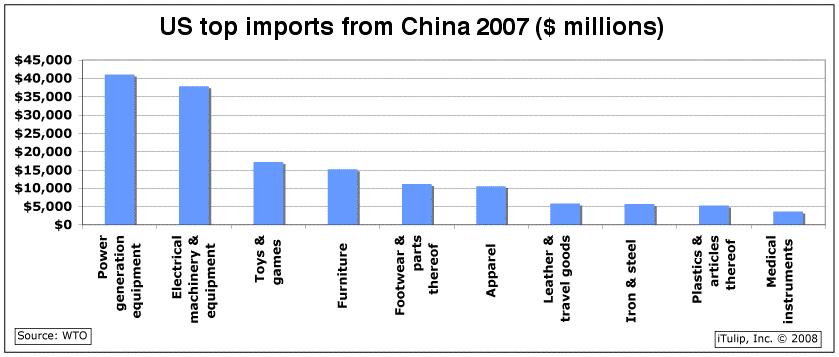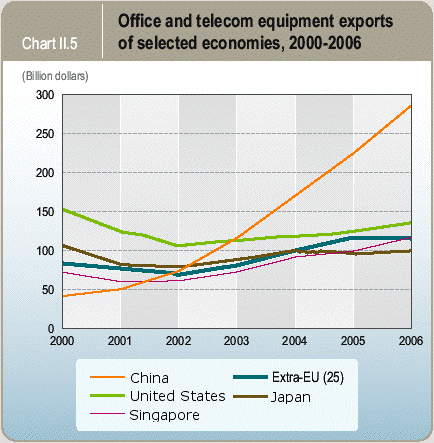 |
Can the US inflate and trade its way back to economic health?
US Trade Representative Susan C. Schwab on Charlie Rose recently explained how free trade and a weak dollar benefits Americans. Her key point is that the US economy creates 15 million new jobs every year and loses 13 million as the economy shifts from growth in one area to growth in another. In the process, only 3% of jobs lost are due to foreign job competition. Meanwhile, cheap imports allow Americans to spend more on domestic goods and services because more disposable income is left over due low prices of imported consumer goods. She also claims that a weak dollar helps US manufacturers compete.
About 16 minutes into the interview, Schwab talks about China. China exports a lot of low tech gear, like shoes and toys, where the US is strong in high valued added goods and services. US exports to China have gone up an average of 20% per year since China joined WTO in 2001. China's exports to the US increased off a much larger base. At 18:30 she states that the problem with trade with China is PR: "It's very visible. You go into a store and the label says Made in China," that China sells toys and games, footwear and apparel while the US sells China "Industrial equipment, machines..."
AntiSpin: She is correct that China ships a lot of toys and games, footwear and apparel to the US by unit volume, but is unit volume as relevant as dollar volume? The World Trade Organization (WTO) web site, where we got the data to create the chart below, show that in fact China by dollar volume primarily sells power generation, electrical and machinery equipment not toys and games.

The US in 2007 imported from China approximately $80 billion in power generation,
electrical machinery and equipment and about the same dollar volume in everything else,
including the toys, games, footwear and so on you see at the local mall.
How about the growth in high intellectual property rights value goods? Take office and telecommunications equipment exports, for example. Surely the US is growing in this area relative to China, especially considering the competitive boost a weak dollar is having for companies like Cisco and IBM. Schwab claims in the interview that a weak dollar is helping US exporters.
Again, the WTO data do not bear this out.

Key: China in orange, USA in green
In 2006, US office and telco equipment exports by the US were up to 19% to $135B from $110B since 2002 when the dollar began to weaken by 50% against and index of other currencies. Yet without accounting for inflation, US exports are still off from a $150B level achieved in 2000. In inflation adjusted terms, dollar volume is off at least 20%. Meanwhile, China's office and telco equipment exports are up from $75B in 2002 to $275B in 2006, a 270% gain.
Didn't the US make this mistake with respect to Japan in the 1970s, incorrectly assuming that Japan was destined to make low quality, low intellectual property value goods while the US excelled in high quality, high intellectual property value goods?
The weak dollar policy is just as misguided, as the data on office and teco equipment show. It is not helping US exporters. This is especially true if your company is a manufacturer of goods that require energy to manufacture, you are getting killed by inflation.
A new level of this inflation epiphany appeared yesterday when DOW Chemical announced an emergency increase in prices of its products.
Dow Raising Prices Most Ever as Energy Costs Surge
May 28, 2008 (Bloomberg)
Dow Chemical Co., the largest U.S. chemical maker, will raise prices the most in the company's 111- year history because of surging costs for energy and raw materials used to make Styrofoam, pesticides and plastics. The ``unparalleled'' increases of as much as 20 percent on all of Dow's 3,200 products are needed after a 42 percent jump in first-quarter spending on raw materials and energy, Chief Executive Officer Andrew Liveris said today. The increases take effect June 1, the company said in a statement.
Dow plans to pass on some of an expected $7.4 billion increase in energy and materials costs this year that Liveris said is due partly to the U.S. government's failure to develop policies to solve a ``true energy crisis.'' Higher food, fuel and metals prices are contributing to inflation and helped boost U.S. consumer prices 3.9 percent in the year ended in April.
``This is our largest across-the-board increase,'' Liveris said today in an interview at the company's headquarters in Midland, Michigan. ``We have a tsunami landing on us here,'' he said, adding that Dow has been boosting prices for four years.
``Dow is probably leading the charge here in being this aggressive, and others are probably going to follow suit,'' Tom Uutala, who helps manage $60 billion, including Dow shares, at Victory Capital Management, said in a phone interview from Cleveland.
Liveris said today the U.S. government's failure to develop a comprehensive energy policy is causing the nation's chemical industry to lose ground to global competitors.
``The country now faces a true energy crisis, one that is causing serious harm to America's manufacturing sector and all consumers of energy,'' Liveris said in the statement.
This is the first such emergency increase in the $54 billion company's 111-year history. The company was able to maintain its policy of giving customers 90 days notice on price increases even during the 1970s oil shock. This time the company is giving customers four days' notice. May 28, 2008 (Bloomberg)
Dow Chemical Co., the largest U.S. chemical maker, will raise prices the most in the company's 111- year history because of surging costs for energy and raw materials used to make Styrofoam, pesticides and plastics. The ``unparalleled'' increases of as much as 20 percent on all of Dow's 3,200 products are needed after a 42 percent jump in first-quarter spending on raw materials and energy, Chief Executive Officer Andrew Liveris said today. The increases take effect June 1, the company said in a statement.
Dow plans to pass on some of an expected $7.4 billion increase in energy and materials costs this year that Liveris said is due partly to the U.S. government's failure to develop policies to solve a ``true energy crisis.'' Higher food, fuel and metals prices are contributing to inflation and helped boost U.S. consumer prices 3.9 percent in the year ended in April.
``This is our largest across-the-board increase,'' Liveris said today in an interview at the company's headquarters in Midland, Michigan. ``We have a tsunami landing on us here,'' he said, adding that Dow has been boosting prices for four years.
``Dow is probably leading the charge here in being this aggressive, and others are probably going to follow suit,'' Tom Uutala, who helps manage $60 billion, including Dow shares, at Victory Capital Management, said in a phone interview from Cleveland.
Liveris said today the U.S. government's failure to develop a comprehensive energy policy is causing the nation's chemical industry to lose ground to global competitors.
``The country now faces a true energy crisis, one that is causing serious harm to America's manufacturing sector and all consumers of energy,'' Liveris said in the statement.
Noteworthy is the absence of DOW CEO Leveris' criticism of "speculators" who have been blamed by many recently for the increase in energy prices. We remain skeptical.
What DOW Chemical and other manufacturing companies are experiencing is as we described in our inflation analysis Inflation in America - Part I: Five signs of inflation; the purchasing power of profits and bank balances is declining rapidly with respect to energy input costs in the production cycle. From a cash flow perspective, DOW is finding itself in the same position as your local restaurant. This is the dark side of the policy of using currency depreciation to grow exports. Short term, it gives the economy a nominal growth boost; long term, it wrecks the nation's competitiveness.
The administration's de facto weak dollar policy is ruining US competitiveness, not helping it, and the resulting inflationary impact on consumers and businesses is hammering the economy, not improving it.
The US needs to open its eyes and understand that China will continue to grow high value exports to compete in key areas of US competitive advantage just as Japan did in the 1980s and 1990s. The first step toward fixing the damage is to confront the problem head on, and stop using ideology based and politically expedient short term policy measures to paper over structural economic weakness.
iTulip Select: The Investment Thesis for the Next Cycle™
__________________________________________________
To receive the iTulip Newsletter or iTulip Alerts, Join our FREE Email Mailing List
Copyright © iTulip, Inc. 1998 - 2007 All Rights Reserved
All information provided "as is" for informational purposes only, not intended for trading purposes or advice. Nothing appearing on this website should be considered a recommendation to buy or to sell any security or related financial instrument. iTulip, Inc. is not liable for any informational errors, incompleteness, or delays, or for any actions taken in reliance on information contained herein. Full Disclaimer



Comment